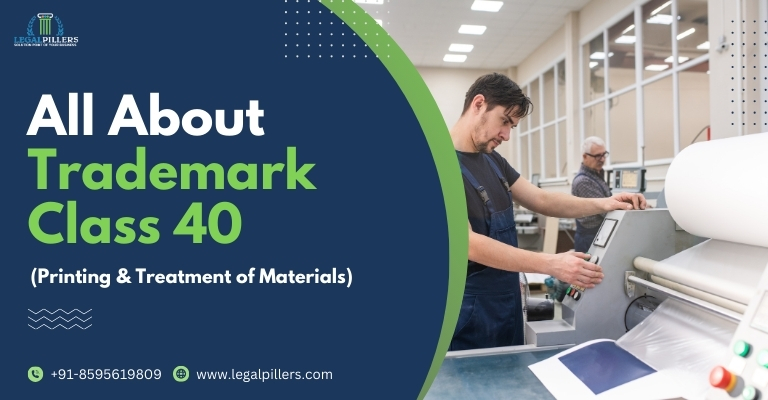
Table of Contents
All About Trademark Class 40
Trademark Class 40 is a category within the Nice Classification system used to classify goods and services for the purpose of trademark registration. Class 40 specifically covers services related to the treatment of materials, such as custom manufacturing, engraving, and various types of transformation and processing of materials, including mechanical, chemical, and custom treatment services. It also includes services related to printing and textile printing. Class 40 encompasses a wide range of industrial and manufacturing services, making it important for businesses looking to protect their trademarks in these areas.
Important services included in Trademark Class 40
Trademark Class 40 mainly includes services like the treatment of materials, recycling of waste and trash, air purification and treatment of water, printing services, and food and drink preservation. The services included in this specific class of trademark are as given below-
- Transformation of an object or substance and any process involving a change in its essential properties, for instance, dyeing a garment, such transformation services are also classified in class 40 if they are provided in the framework of repair or maintenance work, for example, chromium plating of motor vehicle bumpers.
- Services of material treatment which may be present during the production of any substance or object other than a building, for instance, services which involve cutting, shaping, polishing by abrasion or metal coating
- Joining of materials, including soldering or welding
- Processing and treatment of foodstuffs, for example, fruit crushing, flour milling, food and drink preservation, food smoking, and freezing of foods.
- Custom manufacturing of goods to the order and specification of others (bearing in mind that certain offices require that the goods produced be indicated), for instance, custom manufacturing of automobiles
- Services of a dental technician
- Quilting, embroidering, custom tailoring, textile dyeing, applying finishes to textiles.
Services does not included in Trademark Class 40
- Services that do not entail a change in the essential properties of the object or substance, for example, furniture maintenance or repair (included in class 37).
- Services in the field of construction (included in class 37)
- Cleaning services including laundering, window cleaning, cleaning of interior and exterior surfaces of buildings (included in class 37)
- Rustproofing, for instance, anti-rust treatment for vehicles (included in class 37)
- Certain customization services like the custom painting of automobiles (included in class 37)
- Decorating of food, food sculpting (included in class 43)
List of popular examples of Trademark Class 40
- Hindustan Unilever Pureit: They provide water treatment, air purification, and air refreshment services.
- Attero: E-waste management and recycling services.
- Ador: Various kinds of welding services.
List of services classified under Trademark Class 40
The detailed list of services that have been covered under this class is given below:
A
- Abrasion
- Air purification
- Air deodorizing
- Air freshening
- Applying finishes to textiles
B
- Beer brewing for others
- Blacksmithing
- Boilermaking
- Bookbinding
- Burnishing by abrasion
C
- Cadmium plating
- Carbon capture
- Cheese processing services like ripening, maturing and aging of cheese
- Chromium plating
- Cloth edging
- Cloth cutting
- Cloth waterproofing/ fabric waterproofing
- Cloth fireproofing/ fabric fireproofing/ textile fireproofing
- Cloth dyeing
- Cloth pre-shrinking
- Clothing alteration
- Colour separation services
- Consultancy in the field of winemaking
- Crease-resistant treatment for clothing
- Crushing of concrete
- Cryopreservation services
- Custom 3D printing for others
- Custom fashioning of fur
- Custom manufacturing of aircraft
- Custom manufacturing of boats
- Custom manufacturing of bread
- Custom tailoring
- Custom assembling of materials for others
D
- Decontamination of hazardous materials
- Destruction of waste and trash
- Distillation services
- Dressmaking
- Dyeing services
E
- Electroplating
- Embroidering
- Engraving
F
- Fabric bleaching
- Flour milling
- Food smoking
- Food and drink preservation
- Framing of works of art
- Freezing of foods
- Fruit crushing
- Fulling of cloth
- Fur conditioning
- Fur mothproofing
- Fur glossing
- Fur staining
- Fur dyeing
G
- Galvanization
- Gilding
- Glass-blowing
- Gold plating
- Grinding
I
- Incineration of waste and trash
- Irradiation of food
J
- Joinery services [custom manufacturing of woodwork]
K
- Key cutting
- Knitting machine rental
L
- Laminating
- Laser scribing
- Leather staining
- Leatherworking
- Lithographic printing
M
- Magnetization
- Metal plating
- Metal treating
- Metal tempering
- Metal casting
- Millworking
N
- Nickel plating
O
- Offset printing
- Optical glass grinding
P
- Paper finishing
- Paper treating
- Pasteurizing of food and beverages
- Pattern printing
- Permanent-press treatment of fabrics
- Photocomposing services
- Photographic film development
- Photographic printing
- Photogravure
- Planing of material
- Pottery firing
- Printing
- Processing of cinematographic films
- Processing of oil
- Production of energy
- Production of renewable green energy
- Providing information related to material treatment
Q
- Quilting
R
- Recycling of waste and trash
- Refining services
- Rental of air-conditioning apparatus
- Rental of batteries
- Rental of boilers
- Rental of electricity generators
- Rental of industrial robots for use in manufacturing
- Rental of printers for use with computers
- Rental of space heating apparatus
S
- Saddlery working
- Sandblasting services
- Sawing of materials
- Services of a dental technician
- Shoe staining
- Silkscreen printing
- Silver plating
- Skin Dressing
- Slaughtering of animals
- Soldering
- Sorting of waste and recyclable material [transformation]
- Stripping finishes
T
- Tanning
- Taxidermy
- Textile dyeing
- Textile treating or cloth treating
- Textile mothproofing
- Timber felling and processing
- Tin plating
- Tinting of car windows
U
- Upcycling [waste recycling]
V
- Vulcanization [material treatment]
W
- Warping [looms]
- Waste treatment [transformation]
- Water treating
- Welding services
- Window tinting treatment, being a surface coating
- Winemaking for others
- Woodworking
- Wool treating
Trademark Class 40 vs. Other Classes
Trademark Class 40 can sometimes overlap with other classes, making it essential to understand the scope of each class. For example, services related to manufacturing goods (such as custom manufacturing) may also fall under Trademark Class 35 (advertising and business services) if they involve the promotion or advertising of the manufactured goods.
Similarly, textile treatment services may also fall under Trademark Class 37 (construction and repair services) if they involve repairing or maintaining textile goods. Therefore, it’s crucial to carefully evaluate your business’s services and determine the appropriate class or classes for trademark registration.
Conclusion
Trademark Class 40 covers a broad range of services related to the treatment and processing of materials, manufacturing, and printing. If your business falls under this category, it’s essential to register your trademark to protect your brand identity and distinguish it from other businesses. Working with a trademark attorney or agent can help ensure that your trademark application meets all the legal requirements and is appropriately classified.
At LegalPillers, we are here to navigate the complexities of trademark registration and classification effectively and passionately, ensuring that your brand is adequately safeguarded within this important class. Choose LegalPillers as your trusted partner for the classification and registration of the trademark under this trademark class.
(FAQs) about Trademark Class 40
What is Trademark Class 40?
● Trademark Class 40 is one of the 45 classes established by the Nice Classification System to register trademarks. It covers services related to the treatment of materials, such as custom manufacturing and material processing
What types of services fall under Class 40?
● Class 40 includes services like custom manufacturing, material treatment, and various services related to the transformation of materials, such as cutting, milling, and engraving.
Can you provide examples of services in Class 40?
● Examples of services in Class 40 include custom manufacturing of products, textile treatment, engraving services, and recycling services.
Is Class 40 only for manufacturing services?
● No, Class 40 covers a broader range of services related to the treatment or transformation of materials. It includes services related to the processing, customizing, and altering materials.
Why is it important to classify trademarks?
● Classifying trademarks helps streamline the registration process and ensures that trademarks in similar industries or offering similar services are categorized together.
How do I determine if my trademark falls under Class 40?
● You should consult the Nice Classification system or seek legal advice to determine the appropriate class for your trademark based on the nature of your services.
Can a single trademark registration cover multiple classes, including Class 40?
● Yes, a trademark registration can cover multiple classes if your business offers services that fall into different classes. You will need to pay separate fees for each class.
What are the registration requirements for Class 40?
● The registration requirements for Class 40 are similar to those for other classes. You must clearly represent your trademark, specify the services covered, and pay the required fees.
How long does a trademark registration in Class 40 last?
● Trademark registrations typically last for 10 years, but they can be renewed indefinitely as long as the trademark is in use and the renewal fees are paid.
Can I use the ™ symbol with my trademark in Class 40?
● Yes, you can use the ™ symbol with your trademark as soon as you start using it, but it does not provide the same legal protection as a registered trademark (®).
Can I file a trademark application for Class 40 online?
● Yes, many countries offer online trademark registration systems, making it convenient to file for trademark protection in Class 40.
What is the difference between a trademark and a service mark in Class 40?
● Trademarks are used to protect symbols, names, and logos associated with goods, while service marks are used to protect similar elements associated with services, including those in Class 40.
How long does it take to obtain a trademark registration in Class 40?
● The time it takes to obtain a trademark registration can vary by country and the complexity of the application. It can take several months or a few years.
Can I transfer my trademark registration in Class 40 to another person or company?
● Yes, trademark registrations can be transferred to another entity through a process called trademark assignment.
What is the Madrid Protocol and its relevance to Class 40?
● The Madrid Protocol is an international treaty that simplifies the process of obtaining trademark protection in multiple countries. It can be relevant if your services in Class 40 are offered internationally.
Can I protect a sound or scent associated with my services in Class 40?
● Yes, in some jurisdictions, you can register non-traditional trademarks like sounds or scents associated with your services, provided they meet specific criteria.
What is the cost of trademark registration in Class 40?
● The cost of trademark registration varies by country and the number of classes you register. It typically includes application fees, search fees, and attorney fees if you choose to hire one.
Can I cancel or oppose a trademark registration in Class 40?
● Yes, you can oppose a trademark registration during the application process or file a cancellation action after a trademark has been registered if you believe it conflicts with your rights.
What happens if I don’t use my trademark in Class 40 after registration?
● Failure to use your trademark in commerce after registration may result in the cancellation of your trademark registration in some jurisdictions.
Should I consult with a trademark attorney for Class 40 registration?
● It is advisable to consult with a trademark attorney, especially if you have complex trademark needs or if you are filing for protection in multiple countries. They can provide legal guidance and ensure a smoother registration process.



Leave a Reply